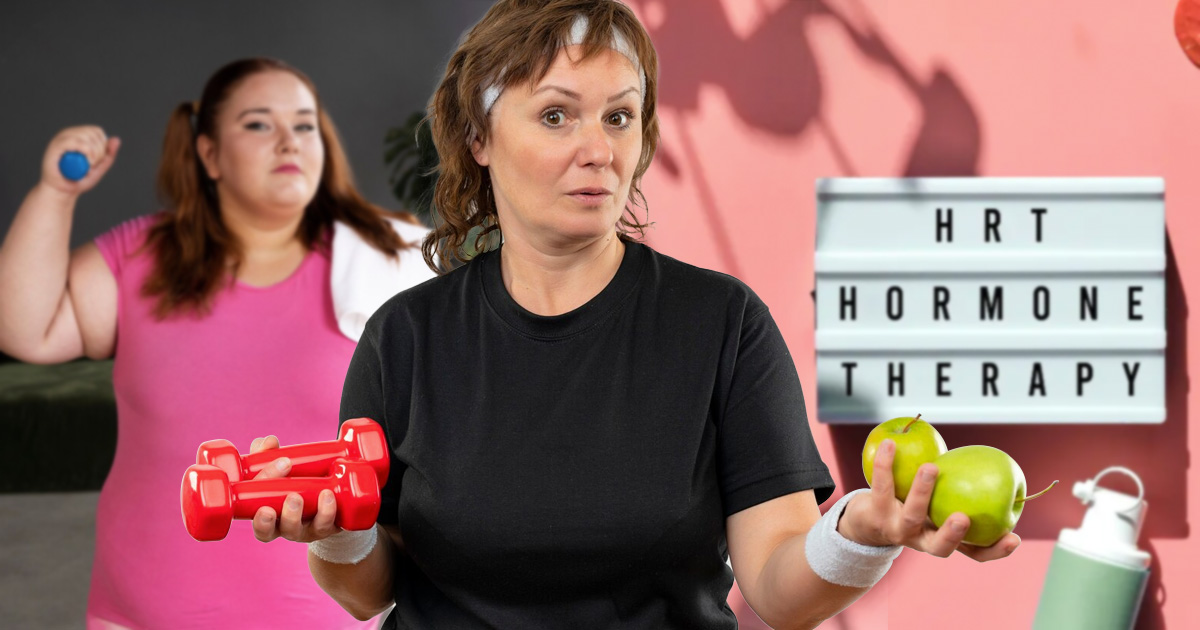Can HRT Help with Weight Loss? A Guide to Benefits, Risks & Considerations

As we get older, our bodies go through big hormonal changes. For women, menopause brings a drop in hormones like estrogen and progesterone, while men experience something similar in andropause, with lower testosterone levels. Research shows that postmenopausal women are more likely to deal with obesity compared to men of the same age. For men, lower testosterone can lead to more belly fat, weaker muscles, and a slower metabolism.
For women, menopause comes with symptoms like hot flashes, mood swings, and trouble sleeping, but weight gain—especially around the belly—is also a common frustration. These changes not only affect how clothes fit but can also raise the risk of serious health issues, like diabetes or heart disease. This weight gain and fat redistribution happen largely because hormonal imbalances make it harder for the body to manage fat properly.
To manage these changes, many turn to hormone replacement therapy (HRT). It’s a well-known treatment for easing menopause symptoms, but recently, it’s been getting attention as a possible way to help with weight management too. Could it be the answer?
What is HRT?
Hormone replacement therapy, or HRT, is a treatment that helps balance the hormones your body stops producing as you age. For women, it usually adds back estrogen and sometimes progesterone, which are key hormones that drop during menopause. For men, testosterone therapy is sometimes recommended for similar issues linked to andropause.
How is HRT given?
HRT can be taken in different ways depending on your needs. Some options include pills, skin patches, gels, creams, or even small implants. Your doctor can help decide which method works best for your lifestyle and symptoms.
What does HRT do?
HRT’s main job is to relieve tough menopause symptoms like hot flashes, mood swings, and night sweats. It helps bring your hormones back to more natural levels, which can also impact things like bone health and energy. But one lesser-known benefit is its potential to help with weight management. Hormonal changes during menopause often make it tough to control weight, particularly belly fat.
Can HRT help with weight loss?
While HRT isn’t specifically for weight loss, it can support your goals by addressing the root causes of menopause-related weight gain. For example, it may reduce fat buildup tied to low estrogen levels and even improve your sleep or energy, making healthy habits easier to stick with.
How Does HRT Help with Weight Loss?
HRT, or hormone replacement therapy, can help with weight issues by fixing hormonal imbalances that make it harder to lose or manage weight. When certain hormones like estrogen or testosterone drop, things like metabolism and how your body stores fat can change. HRT helps bring those hormones back to a better balance, which can make managing weight a bit easier.
1. Boosts Metabolism
Hormonal changes can slow down your metabolism, which means your body burns fewer calories. HRT can help speed it up again, so your body works more efficiently.
2. Cuts Down on Fat Storage
Estrogen plays a big role in where your body stores fat. When your hormone levels are balanced with HRT, it’s easier to keep extra fat, especially belly fat, under control.
3. Gives You More Energy
Low energy is a common problem with hormonal changes. HRT can help you feel more energetic, making it easier to stay active and stick to a healthy lifestyle.
While HRT doesn’t directly cause weight loss, it creates a better environment in your body for healthy habits, like eating right and exercising, to work.
Who should use HRT?
Doctors usually recommend HRT for people struggling with hormone-related challenges. Here are some examples of who might use it:
- Women dealing with menopause symptoms like hot flashes, mood swings, or weight gain.
- Men experiencing low testosterone levels or changes linked to aging, like less muscle or energy.
- People at risk for conditions like osteoporosis, where hormones play a part in bone health.
Gynecologists, endocrinologists, or primary care doctors typically help decide if HRT is a good fit.
Can HRT Be Used Just for Weight Loss?
HRT isn’t a weight-loss treatment. It’s meant to help with symptoms caused by changing hormone levels. It might help you manage weight as an extra benefit, but it’s not meant to be used for weight loss alone. If weight loss is your main goal, a doctor might suggest other ways, like trying a new diet, exercise routine, or specific weight-loss treatments alongside HRT, if needed.
Prioritize Health Over Weight Loss
When it comes to weight loss and HRT, your health should always be the main focus. Being slim doesn’t always mean being healthy. It’s much more important to take care of your body and feel good overall. HRT can help with hormonal symptoms, but it’s not meant to be a quick fix for weight loss.
Simple Tips to Keep in Mind
1. Know Why HRT is Used
HRT is mostly for managing problems like hot flashes, mood swings, or low energy caused by hormone changes. Losing weight may be a side benefit, but it’s not the main reason for taking it.
2. Understand the Risks
Like any treatment, HRT has risks, including things like blood clots or certain types of cancer. Talk to your doctor about the possible side effects.
3. Live a Balanced Life
HRT works best when it’s paired with healthy habits, like eating right, staying active, and keeping stress under control. It’s a team effort!
4. Make It Personal
Everyone’s body is different, and what works for one person might not work for you. HRT should always be part of a plan tailored to your needs.
Lastly, always check with your doctor before starting HRT. They can help you figure out if it’s the right option for your body and your goals. Your health is about much more than just your weight—it’s about living well and feeling your best every day.
